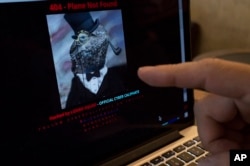Just a few years ago, the news was dominated by the Internet and how it would change the way users do things.
This year, according to an annual consumer trends report, it is users who are changing the Internet.
That's the broad takeaway from a survey that took the pulse not only of consumers in New York, Paris and Tokyo, but also in Moscow, Istanbul, Shanghai, Johannesburg, Sao Paulo and other cities around the world.
Ericsson ConsumerLab, the Swedish multinational provider of communication technology and services, conducted the annual report — called Hot Consumer Trends — surveying a sample representing 68 million urban citizens, aged 15 to 69.
Results show that, in 2016, the Internet will be the foundation of how the world works, travels, socializes, watches TV, shops, eats, exercises and even contacts emergency services.
Michael Bjorn, the leader of the Ericsson ConsumerLab team, says the group identified 10 unique trends regarding what consumers expect to see in their everyday lives, and all of them involve the Internet.
Consumers creating change
"The first trend we're talking about is what we call the 'Lifestyle Network Effect,'" Bjorn said.
That is what happens when a lot of people are using the same service, so everyone's voice gains more value, he explained.
But now, he said, "we're seeing this on such a large scale that it has, of course, a snowball effect on how we are living our lives."
New technology is adopted so fast that early adopters — those hipsters using the new site before anyone else — have less and less influence on what happens in the mass market, he says, while successful new products and services reach consumers much more quickly than before.
A world of reporters
Another trend shows that more and more consumers are learning how to use the Internet to influence what is going on around them.
Bjorn points to a trend Ericsson calls “Netizen Journalists” as an example.
"We're seeing that people are actually aware of the fact that they are sharing more information now than they have ever done before,” Bjorn said. “But they are also telling us that they are looking at what other people are doing and sort of reading and watching what other people are sharing, and the effect is that they believe that they will have a bigger impact and influence on society."
He points out that as many as 37 percent of those surveyed said that exposing a corrupt company online has a greater effect than reporting it to the police.
Ordinary people increasingly rely on user reviews, he says, to share opinions and to influence businesses and authorities to change their behavior.
For instance, 34 percent of smartphone users reported that they share experiences, especially bad ones, and 29 percent read them.
But many people reported being concerned about the reliability of online reviews. Bjorn says as many as 46 percent of those surveyed would like to have a way to confirm if the rumors are true or false.
Hacking, virtual reality
So how secure is the Internet?
"We have a trend that we call ‘Everything Gets Hacked' this year," Bjorn said. "What we're seeing is that people do believe that hacking and viruses are going to continue being an issue in the future. However, we also see as a positive side effect that people are telling us that they actually feel greater trust for an organization that was hacked but was then able to solve the issue."
Another trend shows that watching video content online is on the rise, especially among teenagers, with 46 percent spending at least one hour a day watching YouTube, mostly on smartphones.
Several trends also focus on the future of consumer electronics.
Many respondents believe smartphones soon may be a thing of the past. About half of the smartphone users believe that within five years, artificial intelligence will enable users to interact with gadgets and appliances without using smartphone screens.
"For example," Bjorn said, "we have a trend called ‘Virtual Gets Real,' which is, of course, a lot about this whole idea of virtual reality — for example, of watching sports playing all around you — but we're also seeing that people are expecting this kind of technology to became part of everyday life.
“For example, having a 3-D printer that can print out small plastic details that may break down in products that you have in your home. Or even actually printing out their own food and nutritional supplements on your 3-D printer.”
Bigger role for all
Overall, Bjorn says, people are optimistic about the development of technology.
"They see that they are having greater influence and, also, actually they're seeing things such as technology democratizing education across the world," Bjorn said.
All this will influence the development of democracy, Bjorn says. Citing the "Netizen Journalists" trend, he says people are realizing they have more of a voice — and a role — in society.
And that, concludes the Ericsson report, shows that "consumers are increasingly important as influencers on the future of societal evolution."



